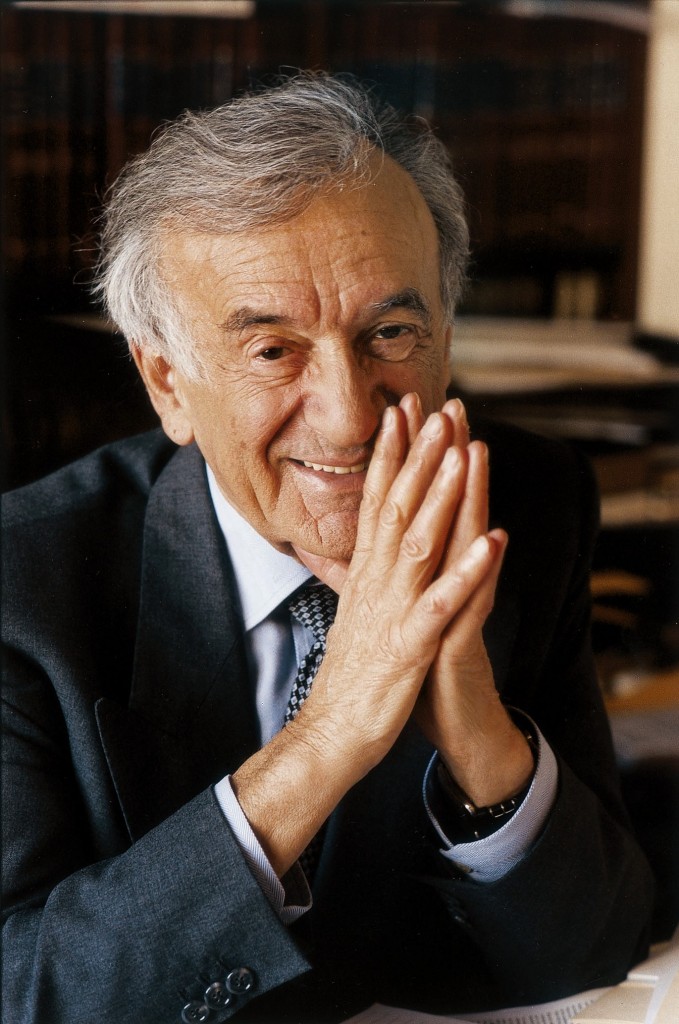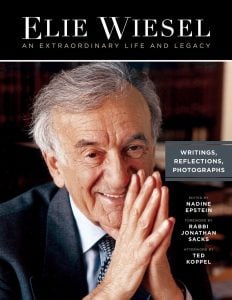
ELIE WIESEL LEGACY PROJECT
AT MOMENT MAGAZINE
Elie Wiesel: A Visual History
Elie Wiesel: An Extraordinary Life and Legacy

In this striking volume, Epstein shares her memories of Wiesel and brings together 36 reflections from friends, colleagues and others who knew him—including his son Elisha Wiesel, Michael Berenbaum, Wolf Blitzer, Father Patrick Desbois, Ben Kingsley, Ronald S. Lauder, Bernard-Henri Lévy, Kati Marton, Itzhak Perlman, Natan Sharansky, Kathleen Kennedy Townsend, Oprah Winfrey and Ruth Wisse. The foreword is by the world-famous British Rabbi Jonathan Sacks and the afterword is by Ted Koppel.
In His Own Words
Remembering
Essay Moment Magazine, May/June Issue 1975
60th Anniversary of the Liberation of Nazi Death Camps
Speech, United Nations Special Session, January 25, 2005
Congressional Gold Medal of Achievement
Speech, The White House, April 19, 1985
Study Questions
1) What scenes from Night do you remember most vividly? Did reading the book change the way you look at the world, political leaders or your friends and family?
2) In his 1986 Nobel Peace Prize acceptance speech, Elie Wiesel said: “One person of integrity can make a difference, a difference of life and death. As long as one dissident is in prison, our freedom will not be true. As long as one child is hungry, our life will be filled with anguish and shame. What all these victims need above all is to know that they are not alone; that we are not forgetting them, that when their voices are stifled we shall lend them ours, that while their freedom depends on ours, the quality of our freedom depends on theirs.” In what ways did the actions of Elie Wiesel’s life reflect the meaning of these words?How does this quote relate to your own role in the world around you?
3) In Night Eliezer describes his life before and during the Holocaust. How is his life similar to yours?How is it different?
4) Who did you identify with most in Night? Who did you most admire in the book?
5) There are people today who insist that the Holocaust never happened and that it was really only a minor event that has been greatly exaggerated. How do you think Elie Wiesel would respond to those people?
6) Some parents have protested that they do not want their children to read Night because it is so grim. How would you respond to those who say that the book should not be required reading in public schools?
7) Elie Wiesel believed that the most dangerous and destructive thing for mankind was not hatred but in-difference. What do you think he meant by this? Do you agree with him?
8) Why do you think Elie Wiesel wrote Night?
9) In his 1986 Nobel lecture, Elie Wiesel spoke of the power of memory, including the idea that the mem-ory of death can serve as a shield against death. He mentions several sources of injustice in the 1980s such as Apartheid in South Africa, as well as fears that are still with us, such as terrorism and the threat of nuclear war. Do you think the 21st century will be distinguished by remembrance, or by forgetting?
10) In Night Eliezer expresses sympathy for Job, the biblical figure who experienced tremendous losses as Satan and God debated Job’s faithfulness. After watching the lynching and slow death of a young boy, Eliezer believes that God is hanging from the gallows as well. In his 1986 Nobel lecture, Elie Wiesel de-scribes the Holocaust as “a universe where God, betrayed by His creatures, covered His face in order not to see.” How did Wiesel’s relationship with God evolve and change over the course of his life? In general, how do you think survivors of the Holocaust reconciled their experiences with their faith?
11) In the final pages of Night, Elie Wiesel describes his own face reflected in a mirror. He writes that a corpse stared back at him with a look that has never left him. What aspects of Elie Wiesel died during the ordeal of the Holocaust? Which parts of him were born in their place? What do you make of his observation that among the men liberated with him, none of them ever sought revenge?
12) Night was initially rejected by numerous major publishing houses in both the United States and France. Night is now a classic that has inspired numerous other works. What is unique about Elie Wiesel’s story? How does his approach compare with the work of other memoirists who you have read?
13) Could an event like the Holocaust happen today? Could it happen in the United States? Who would be the potential victims? How would you respond if an event like the Holocaust occurred today?
14) What have you learned about Elie Wiesel from this book that you didn’t know before? How has that affected you?
